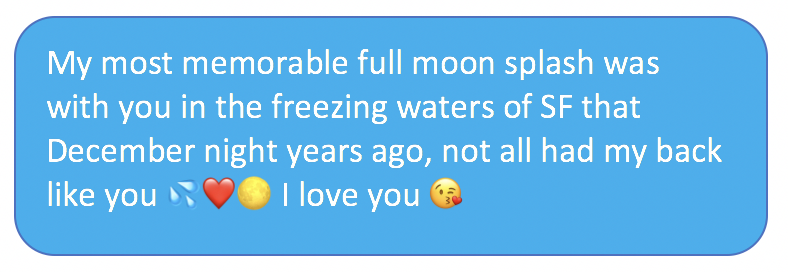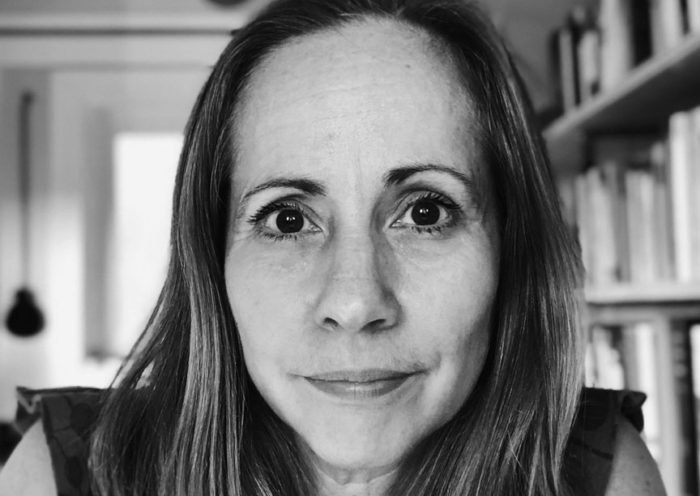Savior
by Katy Van Sant

Rebecca sat in a folding chair from Big 5 on the banks of the Russian River, an hour north of San Francisco. She heard her phone ding and retrieved it from the drink holder in the armrest. Wow. She hadn’t thought about that night in over twenty years. She gazed out through the green water and splashing frolickers.
Rebecca remembered Julia that night wading into the bay. She had taken off everything except her underwear and walked alone across the soft sand into the dark waters. Beautiful in the moonlight. Julia didn’t say anything before she walked into the bay. No let’s go for a swim, or who’s going in with me.
Julia’s favorite nephew who she had helped raise had been shot and killed only two months earlier. Rebecca had been observing her throughout the night as they celebrated another coworker’s birthday and she could see how she struggled to contain the pain that she was steeping in. The more she drank, the less she was able to hold it in. When a racist woman accused them of going after her boyfriend, Stay away from my man and go back to where you came from, Julia had cried, “No!” in a low, desperate voice as she stood up to go at the woman. It sounded like a plea to herself, trying to stop herself, but it also said not again, no more, why are you doing this to me? Rebecca and the others verbally backed her up, while they held her back physically. Then the woman said she had called the police and Rebecca’s group stumbled down to that little cove before they arrived.
Rebecca had taken off her clothes and gone in after Julia. Body hot and rosy white from the whiskey and adrenaline, she didn’t even feel the cold. As she entered the water she recalled how she’d learned to drag a body while swimming, hooking one arm under the armpit and around the shoulder. Would she be able to do it? She gave Julia her space, but she stayed ready.
Rebecca stared at the phone trying to think of how to reply and wondering what exactly Julia was trying to say. Not all had my back like you. Does that mean she really was going to try to drown herself in the bay? Because that’s what Rebecca had thought when she saw her walk in. She could still to this day see the image that came to her. Julia’s firm brown body drifting in the deep, surrounded by seahorses and sparkling coral, her long dark hair intertwined with streams of seaweed.
As she recalled that night, it dawned on Rebecca that that was when it had started with her step-son Alex. It was not long after that night, probably the Spring of the next year, that Rebecca saved Alex’s life for the first time. She was doing the dishes and he was behind her, playing on the kitchen floor. Rebecca’s boyfriend Andres, later to become husband, had left her alone with his son Alex for the first time. It was an emergency. Alex’s mother was in the hospital and Andres had taken his older son to visit her. Alex, 3-years-old at the time, hadn’t been told why his father was gone, but she could tell that he sensed something was different. There was a very slight shift in his behavior. Kids don’t need to know the details. Not like adults, or at least, Rebecca, a self-admitted busybody, who had to know everything and everyone’s business.
That evening, as she picked up a spaghetti encrusted plate, an alertness came over her, transformed her. It was a sensation that filled her in the presence of danger. Rebecca turned around and Alex was looking at her, mouth opened. He made no sound, but his eyes said it all. Those damned marbles. His little windpipe had a marble lodged in it blocking it entirely. Rebecca could see it in her mind’s eye. She didn’t move fast or slow. Deliberately. It was like she was watching herself from above as she calmly walked over to him, got down on her knees, turned him around, slipped her arms around his torso, made a fist with her right hand and cupped it with her left. Silently count to three and quickly push in and upward. Pop! The marble shot out of his mouth, rolled across the hardwood floor and disappeared under the table.
Neither of them said anything for three seconds. Stunned. Rebecca started to come back into herself.
“Are you okay?” Alex only smiled. “That marble was in your windpipe, blocking your throat so you couldn’t breathe.” He kept smiling, which was something she was used to by now. Alex had a speech and language disorder and often didn’t know what to say, or how to say it, or what was being asked of him. At three, he only had a few words. As he got older the sentences that would come out of his mouth were often incomprehensible, even to Andres and Rebecca. One of his coping mechanisms was simply to smile. It could be infuriating, but at this moment, relief at seeing that familiar smile rushed over Rebecca as she started to comprehend that he could have died, had she not been close-by and known what to do. She turned away, faced the sink again, so he wouldn’t see her cry. But she knew he knew. Alex may have had difficulty with words, but from a very young age, his powers of perception when it came to feelings and moods were another matter. If she was getting upset, maybe during a conversation with his dad, Alex would catch it before Rebecca herself even realized how her mood was shifting and Alex would interrupt and, once he learned to talk, he would try to steer the conversation in a different direction. He often amazed her.
After that Rebecca saved Alex’ life a total of thirteen times. It just kept happening. And each time it happened Rebecca always felt like he was the one saving her life. He was giving her something, offering her something, pushing her in some direction, but she couldn’t figure out where. As he got older, the life-saving became a joint effort. They were saving his life, doing it together. Or were they saving her life? There was the time they were swimming together in the Pacific Ocean in Baja. Suddenly the sand was no longer beneath her feet and Rebecca could feel the two of them being pulled out. Alex was only seven years old. Again, Rebecca was out of her body, felt another force take over. Was it him? Was it Alex himself?
“We have to swim as hard as we can towards the shore. Don’t stop. Use your arms and legs.” He said nothing and did exactly as she’d commanded. She swam behind him, giving him little pushes. When they made it to the beach they sat side by side, panting.
There was the time they were in the ocean in Rebecca’s brother’s inflatable canoe on a weekend they’d been camping on the Mendocino Coast. The waves were pounding and tossing the canoe closer and closer to the rocks. Again, they paddled together, strong and determined, sweating under the cold ocean spray until they reached safety. Each time she felt a deepening gratitude that she didn’t understand. Each time a well of mystery, of teaching, of life, of majesty opened wider and wider. She was swimming in it, searching for the meaning
There was the time he was running full-speed into a busy street and she scooped him up and they both fell over on the edge of the street as a car sped by. But most of the life-saving had involved water and breath. Drowning or suffocating. Rebecca connected it to his difficulty with speech, an attack on the passageway that made verbalization possible. To Rebecca language was life. She was not an animal person and could not connect with pets because they couldn’t speak. She needed to know, through words, what people thought and felt and she needed to express herself in that same way. What did it all these life-saving experiences mean? Why couldn’t someone just explain it to her? Why couldn’t she google it and read a few articles and easily understand what was happening?
As he grew into a young man his ability to converse, to express himself and to comprehend verbal meaning improved, but it never surpassed his other senses, not even close. After many struggling years of schooling full of frustrations and bittersweet triumphs, of self-educating and clumsy advocating for Alex, he was now in a good place, at peace with his life and his abilities. Working as a veterinarian’s assistant his skills not only with the animals, but with their owners were appreciated. Using very few words, he had a way of calming scared or nervous pet-owners. He lived at home with his father and Rebecca.
Rebecca sat in her beach chair staring out at the green waters of the Russian River. The beach was packed with city folk, awkward on the hot rocks and cold water, enjoying a summer weekend day away from foggy San Francisco. Alex and Lili were among them. Practicing the steps of an awkward, time-honored dance of new love. The text from Lili’s mom had come in fifteen minutes ago and Rebecca relived that night several times as she sipped her beer. What was Julia trying to tell her? Not all had my back like you. When nothing had happened that night, when she didn’t end up having to save Julia – talk her down or swim back to shore tugging her body behind her – she had assumed Julia never had any intention of drowning herself. She chalked it up to a crazy drunken night. But now, twenty years later, she wondered. Did I save her life? Is that what she’s saying? The emotion that came up was pride at the thought of saving Julia’s life. Pride was uncomfortable, inappropriate. Shame. Rebecca felt shame at her pride, but at the same time an unstoppable desire to know. She wanted to know she’d saved Julia’s life. She wanted everything to fit together like a tidy puzzle where she came out the hero. She saved Julia that night in order to ensure that Lili would come into this world. Then she saved Alex over and over again so that in the end Lili and Alex would find each other. That’s what Rebecca wanted confirmation on. Wanting that felt bad, but so good. How to respond to the text in order to get the confirmation she craved.

Rebecca hit send and immediately hid the phone in the bottom of her snack basket, stood up from her beach chair in her slowed-down, middle-aged fashion, nothing like the young woman who’d bounded into the bay after her friend that long-ago night, and walked down to the water’s edge to cool off. She stood with her feet submerged and searched for her son and her friend’s daughter. For an instant she seized up. Was he drowning again? But then she spotted the two of them in the water together, chest high, bobbing slightly, in an embrace. She could feel the excitement of their fresh love. Loss washed over her, followed by a lonely liberation. He didn’t need her anymore. She slowly waded into the cool green water.
When she returned to her chair, she fished her phone out from the snack bag.

BIO

Katy Van Sant is an emerging writer and translator who has won prizes from Glimmer Train and The Mendocino Coast Writers’ Conference. She has been published in Months to Years Literary Journal and Strangers’ Guide Magazine. She has written two novels and is currently working on a book exploring the circumstances surrounding the murder of her grandfather. She lives with her partner and children in San Francisco, California. Find out more about Katy at Twitter or Facebook.


















